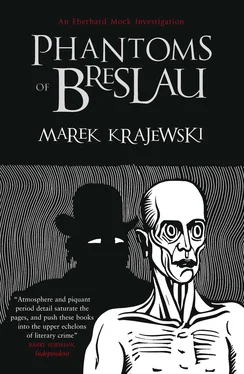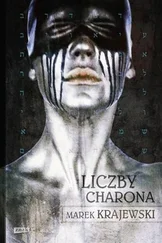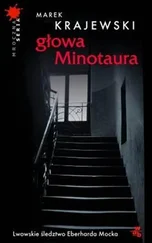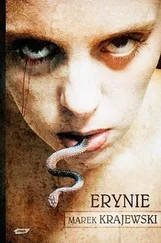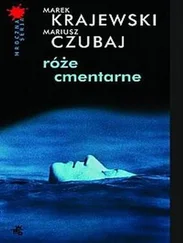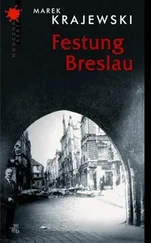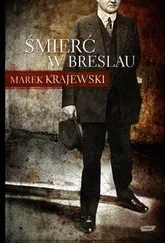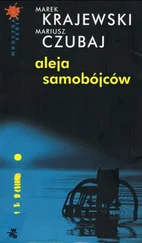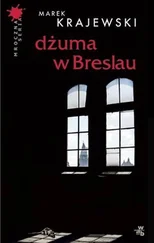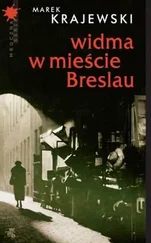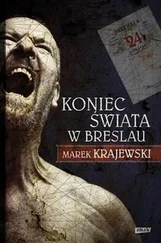Marek Krajewski - Phantoms of Breslau
Здесь есть возможность читать онлайн «Marek Krajewski - Phantoms of Breslau» весь текст электронной книги совершенно бесплатно (целиком полную версию без сокращений). В некоторых случаях можно слушать аудио, скачать через торрент в формате fb2 и присутствует краткое содержание. Жанр: Полицейский детектив, на английском языке. Описание произведения, (предисловие) а так же отзывы посетителей доступны на портале библиотеки ЛибКат.
- Название:Phantoms of Breslau
- Автор:
- Жанр:
- Год:неизвестен
- ISBN:нет данных
- Рейтинг книги:3 / 5. Голосов: 1
-
Избранное:Добавить в избранное
- Отзывы:
-
Ваша оценка:
- 60
- 1
- 2
- 3
- 4
- 5
Phantoms of Breslau: краткое содержание, описание и аннотация
Предлагаем к чтению аннотацию, описание, краткое содержание или предисловие (зависит от того, что написал сам автор книги «Phantoms of Breslau»). Если вы не нашли необходимую информацию о книге — напишите в комментариях, мы постараемся отыскать её.
Phantoms of Breslau — читать онлайн бесплатно полную книгу (весь текст) целиком
Ниже представлен текст книги, разбитый по страницам. Система сохранения места последней прочитанной страницы, позволяет с удобством читать онлайн бесплатно книгу «Phantoms of Breslau», без необходимости каждый раз заново искать на чём Вы остановились. Поставьте закладку, и сможете в любой момент перейти на страницу, на которой закончили чтение.
Интервал:
Закладка:
“Could it be a shoe with a print like this?” This time it was Reinert who had interrupted. “I made this drawing at the scene of crime.”
“Yes, it’s possible,” Lasarius said without bridling at the policeman. “These contusions are the result of significant pressure, conceivably applied by somebody wearing shoes jumping on their limbs. Gentlemen” — he drew on his cigar and extinguished it in an ashtray, scattering sparks — “it is as if the murderer jumped onto their arms and legs while they were propped on a bench, stone or some other object …”
“But surely that was not the cause of their death?” Mock asked.
“No, I’m just going to read you my findings,” Lasarius sighed with evident annoyance. He began: “The cause of death was stab wounds to both lungs as well as a haemorrhage of the left pulmonary cavity and a clot in that same cavity.” Lasarius looked at Mock and said in a hoarse voice: “The murderer stuck a long, sharp instrument between their ribs and then practically pierced the lungs all the way through. They would have been in agony for several hours. Now, please ask your questions.”
“What kind of instrument could that have been, Doctor?” Muhlhaus asked.
“A long, sharp, straight knife,” the pathologist replied. “Although there is another instrument which seems even more likely to me …” He passed his hands — their skin devoured by chemicals — over his bald pate. “No, that would be absurd …”
“Go on, Doctor!” Mock and Muhlhaus shouted almost simultaneously.
“Those men’s lungs were pierced with needles.”
“What sort of needles?” Kleinfeld leaped from his chair. “Needles for knitting socks?”
“Exactly.” Lasarius hesitated briefly, then formed an elaborate conditional sentence: “Were I to examine these remains in the context of a medical error, I would say that some quack had made a bad job of tapping their lungs.” Lasarius slipped his cigar stump into his waistcoat pocket. “That’s exactly what I’d say.”
Silence descended. The steady, powerful voice of an interrogating police officer reached them from the next room: “Listen, you and your men have to try harder … What are we paying you for, you shits? We want to know everything that’s going on in your area, understand?” Drops of rain rapped against the windows. The officers sat in silence, frantically racking their brains for intelligent questions. Mock stretched his hands out in front of him and studied his knuckles which were lost in folds of skin.
“One more question.” Mock lifted his hands, then dropped them on the table again. “You inspected the scene where the bodies were found very carefully, Doctor. Could that also be where the crime was committed?”
“I found no traces of blood from the eye sockets on the ground or grass around the victims’ heads, which means that their eyes were gouged out elsewhere. The remaining injuries led only to internal haemorrhaging, and from those we can deduce nothing as to where the crime was committed. But I’ll still carry out an Uhlenhuth blood test, as a formality. Can I go now?” Lasarius got to his feet and made towards the exit without waiting for a response. “Some of us have work to do.”
“Commissioner, sir,” Mock’s hands rose once more and fell with a slap on the table top. “The murderer wrote a message on a card for me. I’m to admit to some mistake, I’m supposed to believe in something, or we’re threatened with more murders. Let’s read it again. ‘Blessed are those who have not seen and yet have believed. Mock, admit your mistake, admit you have come to believe. If you do not want to see more gouged eyes, admit your mistake.’” Mock lit a cigarette and immediately regretted it when he realized that all those assembled had noticed his hands were shaking. “I assure you I don’t know what mistake he’s referring to, or what I am to admit to. But there is also this Biblical quotation. Let us pursue that. Unless I’m mistaken it refers to doubting Thomas, who came to believe only when he had seen the risen Christ with his own eyes.”
Mock approached the revolving board in the corner of the briefing room, wedged it still and wrote in even, beautiful script: “doubting Thomas = Mock, Christ = murderer, murdered sailors = warning for Mock.”
“The first two equations are clear,” Mock said, angrily shaking the chalk dust from his sleeve. “The murderer is a religious fanatic who has sent a message to an unbeliever — me. When I discover what ‘mistake’ I am being punished for, I’ll also discover the murderer and my ‘mistake’ will become evident to everyone. Because everyone is going to ask: ‘Why did that swine kill four young men?’ The answer is: because he wanted to punish Mock for something. ‘And what did Mock do?’ everyone is going to ask. And I don’t know the response to that at this stage. Everyone will find out how Mock once harmed the murderer, everyone will find out what Mock has been punished for. And that’s what the murderer is aiming at. If that pig had killed some old woman, it would have blown over without a murmur. A week ago, in Morgenau, two old women were killed by P.O.W. soldiers freed by the Russians. They stole twelve marks from them. Imagine — the equivalent of two theatre tickets! Did that shake public opinion? Not in the least! Who cares about some murdered old women?”
“I know what you’re saying,” interrupted Muhlhaus. “The murder has to be spectacular because only in this way will the murderer draw people’s attention to your alleged guilt. And what could be more spectacular than gouging out the eyes of four young men in leather underpants?”
“You know,” Mock said slowly, “I’ve got a terrible feeling … I don’t know what I’m supposed to be admitting to so I can’t say anything … I’m not going to say anything and the world’s not going to find out a thing from me … And he …”
“He’s going to get more and more frustrated,” said Lasarius, who was standing in the doorway listening attentively to Mock’s deductions. “He’s going to wait and wait for you to admit to your guilt … Until, until …” Lasarius searched for the appropriate word.
“Until he gets truly pissed off …” Smolorz came to his aid.
BRESLAU, THAT SAME SEPTEMBER 1ST, 1919
TWO O’CLOCK IN THE AFTERNOON
Above the entrance gate to Casar Wollheim, River Shipyard and Navigation Company at the river port of Cosel, hung enormous banners with the slogans: “Strike — Unite with our Comrades in Berlin” and “Long Live the Revolution in the Soviet Union and Germany”. In the gateway stood workers wearing armbands; some wielded Mauser rifles in their calloused hands. On the other side of the street, with West Park at their backs, soldiers from the Freikorps were arranged in battle formation, staring starkly at their adversaries’ red-starred banners.
The droschka carrying Mock and Smolorz stopped a fair distance from the entrance to the shipyard. The passengers climbed out and the cabby pulled slowly to the side, unhitched his horse and gave it some fodder. Mock contemplated the ideological conflict before him and decided that, as a state functionary, he rather sided with the opponents of proletarian revolution. Not wanting to hear the whistle of flying bullets in the square, which was on the verge of becoming a battleground, he and Smolorz hurriedly approached the commander of the Freikorps . Mock showed his identification and, silently rueing his rough tongue swollen with yesterday’s alcohol and tobacco, forced himself to ask questions. He did not need an explanation of the present situation; all he needed was one piece of information: the location of the port’s director. Company Commander Horst Engel immediately summoned an old sailor whom he introduced to Mock as his informer. Mock thanked Engel and, stooping beneath a non-existent yet possibly imminent hail of bullets, led the informer Ollenborg to the droschka. The old sailor told him that the grand launching of a small passenger ship, the Wodan , which was to cruise the Oppeln-Stettin line, was taking place at that very moment. Julius Wohsedt, the director of the port, was sure to be there. Ollenborg then showed Mock a side gate which was not blockaded by revolutionaries.
Читать дальшеИнтервал:
Закладка:
Похожие книги на «Phantoms of Breslau»
Представляем Вашему вниманию похожие книги на «Phantoms of Breslau» списком для выбора. Мы отобрали схожую по названию и смыслу литературу в надежде предоставить читателям больше вариантов отыскать новые, интересные, ещё непрочитанные произведения.
Обсуждение, отзывы о книге «Phantoms of Breslau» и просто собственные мнения читателей. Оставьте ваши комментарии, напишите, что Вы думаете о произведении, его смысле или главных героях. Укажите что конкретно понравилось, а что нет, и почему Вы так считаете.
